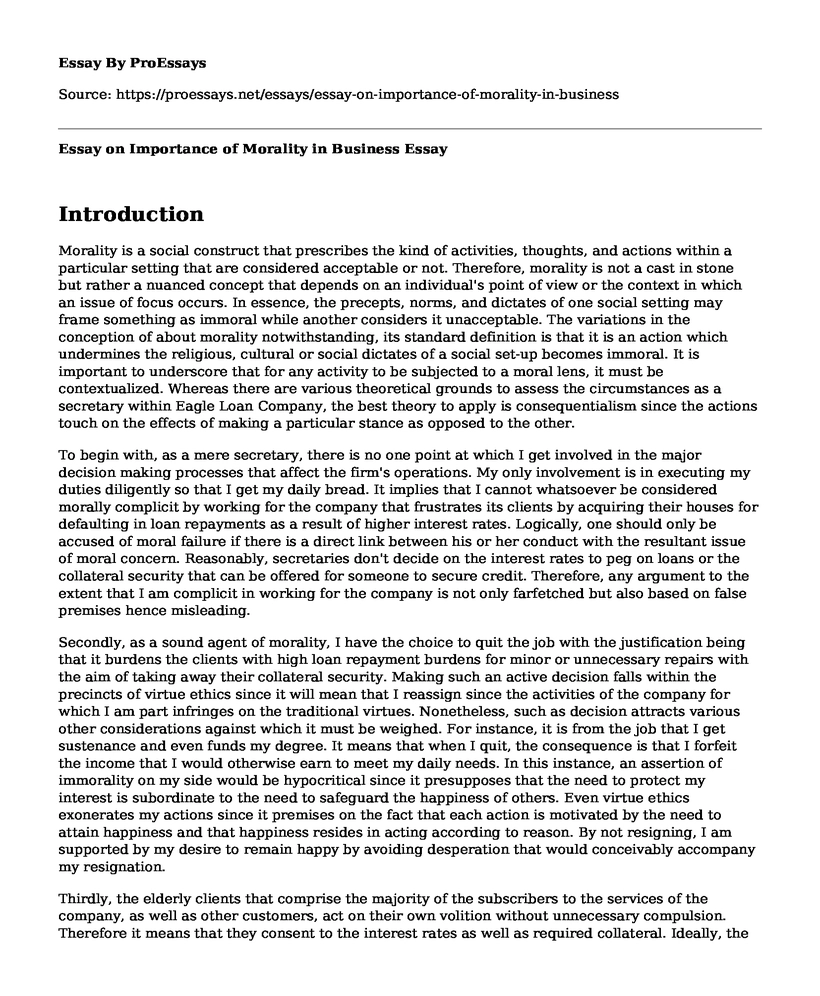Introduction
Morality is a social construct that prescribes the kind of activities, thoughts, and actions within a particular setting that are considered acceptable or not. Therefore, morality is not a cast in stone but rather a nuanced concept that depends on an individual's point of view or the context in which an issue of focus occurs. In essence, the precepts, norms, and dictates of one social setting may frame something as immoral while another considers it unacceptable. The variations in the conception of about morality notwithstanding, its standard definition is that it is an action which undermines the religious, cultural or social dictates of a social set-up becomes immoral. It is important to underscore that for any activity to be subjected to a moral lens, it must be contextualized. Whereas there are various theoretical grounds to assess the circumstances as a secretary within Eagle Loan Company, the best theory to apply is consequentialism since the actions touch on the effects of making a particular stance as opposed to the other.
To begin with, as a mere secretary, there is no one point at which I get involved in the major decision making processes that affect the firm's operations. My only involvement is in executing my duties diligently so that I get my daily bread. It implies that I cannot whatsoever be considered morally complicit by working for the company that frustrates its clients by acquiring their houses for defaulting in loan repayments as a result of higher interest rates. Logically, one should only be accused of moral failure if there is a direct link between his or her conduct with the resultant issue of moral concern. Reasonably, secretaries don't decide on the interest rates to peg on loans or the collateral security that can be offered for someone to secure credit. Therefore, any argument to the extent that I am complicit in working for the company is not only farfetched but also based on false premises hence misleading.
Secondly, as a sound agent of morality, I have the choice to quit the job with the justification being that it burdens the clients with high loan repayment burdens for minor or unnecessary repairs with the aim of taking away their collateral security. Making such an active decision falls within the precincts of virtue ethics since it will mean that I reassign since the activities of the company for which I am part infringes on the traditional virtues. Nonetheless, such as decision attracts various other considerations against which it must be weighed. For instance, it is from the job that I get sustenance and even funds my degree. It means that when I quit, the consequence is that I forfeit the income that I would otherwise earn to meet my daily needs. In this instance, an assertion of immorality on my side would be hypocritical since it presupposes that the need to protect my interest is subordinate to the need to safeguard the happiness of others. Even virtue ethics exonerates my actions since it premises on the fact that each action is motivated by the need to attain happiness and that happiness resides in acting according to reason. By not resigning, I am supported by my desire to remain happy by avoiding desperation that would conceivably accompany my resignation.
Thirdly, the elderly clients that comprise the majority of the subscribers to the services of the company, as well as other customers, act on their own volition without unnecessary compulsion. Therefore it means that they consent to the interest rates as well as required collateral. Ideally, the company helps subscribers who cannot meet the requirements for getting a bank loan. At this point, there should not be a question or morality since the company does not force anyone into entering a contract with it. It is them that weigh the possibility of accessing the loans from the firm, however exorbitant they may be seen, offered by the firm against the reality that they may never obtain any credits from any other financial institution.
Conclusion
Since I have all the required qualifications to be an employee of the company, I reserve the rights to work there as dictated by the rights-based theories. In essence, I have a liberty to be employed hence the firm acts as an agent to facilitate the achievement of that right. This fact coupled with the business which technically distinguishes a firm from its workers or shareholders makes me not morally liable in any way. In essence, being just a worker shifts the moral burden for any action from an employee to the firm. Therefore, the allegations that the firm for which I work partners with another that only shoddily repairs the houses and at overpriced rates should be lounged against the firm as an entity and not myself. My interest in the firm is working hard for pay. That is all. I am not in any way a beneficiary of the excess money that the firm gets from alleged excess interests on loans hence should not be considered morally guilty.Cite this page
Essay on Importance of Morality in Business. (2022, Mar 27). Retrieved from https://proessays.net/essays/essay-on-importance-of-morality-in-business
If you are the original author of this essay and no longer wish to have it published on the ProEssays website, please click below to request its removal:
- Compare and Contrast Essay on Utilitarianism vs. Deontology
- Paper Example on Fitness Business and Issues
- The Ethics of Leadership Essay Example
- Paper Example on Existence of Evil: Analyzing Philosophical Knowledge
- Essay Example on Unfair Labor Practices: Violations of Employee Rights
- California Restaurant Owner Opposes Rising Minimum Wage - Essay Sample
- Report Example on Trianon Ventures into Hungary Business Market, Fails, Then Succeeds







